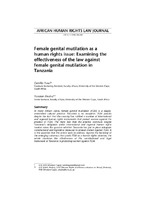Female genital mutilation as a human rights issue: examining the effectiveness of the law against female genital mutilation in Tanzania
Abstract
In many African states, female genital mutilation (FGM) is a deeply-entrenched cultural practice. Tanzania is no exception. FGM persists despite the fact that the country has ratified a number of international and regional human rights instruments that protect women against the practice of FGM. The mere fact that the practice continues despite Tanzania's obligation under international and regional human rights treaties raises the question whether Tanzania has put in place adequate constitutional and legislative measures to protect women against FGM. It is this question that this article seeks to address. Against the backdrop of the emerging consensus that posits FGM as a human rights violation, the article examines the effectiveness of the constitutional and legal framework of Tanzania in protecting women against FGM.

